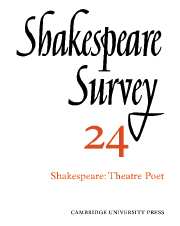Book contents
- Frontmatter
- Hearing Shakespeare: Sound and Meaning in ‘Antony and Cleopatra’
- ‘More Pregnantly Than Words’: Some Uses and Limitations of Visual Symbolism
- Shakespeare and the Limits of Language
- Revenge, Retribution, and Reconciliation
- Shakespeare the Professional
- Shakespeare’s Talking Animals
- The Morality of ‘Love’s Labour’s Lost’
- Shakespeare’s ‘Earth-treading Stars’: the Image of the Masque in ‘Romeo and Juliet’
- ‘Hamlet’ and the ‘Sparing Discoverie’
- ‘Hamlet’ in France 200 Years Ago
- The Hamlet in Henry Adams
- ‘Pericles’ and the Dream of Immortality
- A Necessary Theatre: The Royal Shakespeare Season 1970 Reviewed
- Free Shakespeare
- The Year's Contributions to Shakespearian Study 1 Critical Studies
- 2 Shakespeare’s Life, Times, and Stage
- 3 Textual Studies
- Index
- Plate section
‘More Pregnantly Than Words’: Some Uses and Limitations of Visual Symbolism
Published online by Cambridge University Press: 28 March 2007
- Frontmatter
- Hearing Shakespeare: Sound and Meaning in ‘Antony and Cleopatra’
- ‘More Pregnantly Than Words’: Some Uses and Limitations of Visual Symbolism
- Shakespeare and the Limits of Language
- Revenge, Retribution, and Reconciliation
- Shakespeare the Professional
- Shakespeare’s Talking Animals
- The Morality of ‘Love’s Labour’s Lost’
- Shakespeare’s ‘Earth-treading Stars’: the Image of the Masque in ‘Romeo and Juliet’
- ‘Hamlet’ and the ‘Sparing Discoverie’
- ‘Hamlet’ in France 200 Years Ago
- The Hamlet in Henry Adams
- ‘Pericles’ and the Dream of Immortality
- A Necessary Theatre: The Royal Shakespeare Season 1970 Reviewed
- Free Shakespeare
- The Year's Contributions to Shakespearian Study 1 Critical Studies
- 2 Shakespeare’s Life, Times, and Stage
- 3 Textual Studies
- Index
- Plate section
Summary
When the Painter in Timon of Athens puts the Poet in his place by pointing out that not only is his message ‘common’ but it also needs another medium –
A thousand moral paintings I can show
That shall demonstrate these quick blows of Fortune's
More pregnantly than words –
(I, i, 93–5)then, obviously, neither interlocutor is concerned with the idea of a 'theatre poet'. Despite his fine lines on the nature of poetic inspiration, the Poet thinks of poetry mainly as something which gives outward form to an inner moral. And his narrow definition of style as a garment is so tied up with his sycophantic use of poetry that both can be punctured by the disillusioned Timon, in an even more relentless reminder of the limits of language:
Poet. I am rapt, and cannot cover
The monstrous bulk of this ingratitude
With any size of words.
Timon. Let it go naked: men may see't the better.
(v, i, 62-5)- Type
- Chapter
- Information
- Shakespeare Survey , pp. 13 - 18Publisher: Cambridge University PressPrint publication year: 1971
- 2
- Cited by

